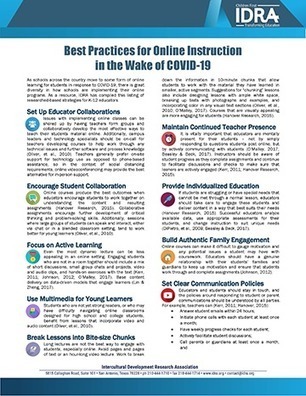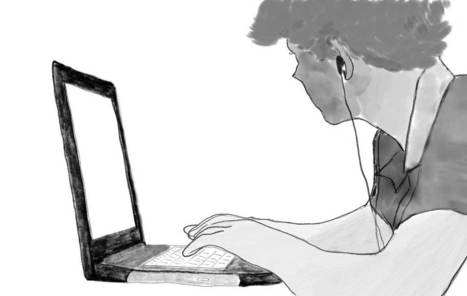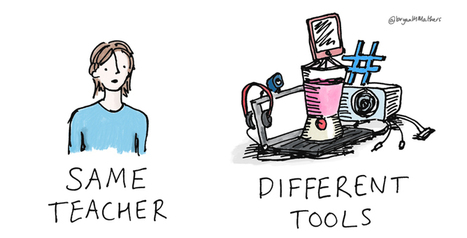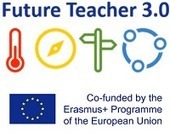 Your new post is loading...
 Your new post is loading...
The perfect class discussion can feel like something of an alchemy. From the instructor’s preparation to the students’ personalities, many ingredients can enable or challenge the social construction of knowledge in a class community. As Jay Howard suggests, quality discussions require a great deal of planning and an understanding of social, emotional, and intellectual dynamics (Howard 2019). As we begin one of the most unusual semesters in the history of higher education, with institutions implementing a combination of remote, hybrid, and in-person instruction, it’s urgent to consider how we can facilitate meaningful discussions in virtual environments. In particular, if instructors used video conference software during the emergency remote teaching of the spring and summer, they may have experienced a ghost town of student reticence and awkward silences, and the occasional shuffle of video boxes like virtual tumbleweeds..
This blog was kindly contributed by Dr David LeFevre, Director of the EdTech Lab at Imperial College and the founder of higher education platform company Insendi, part of Study Group. Last month a subtle warning shot was shot across the bows of universities still struggling to manage the disruption caused by Covid-19. When the Minister responsible for higher education announced that UK students would be charged full tuition fees for online study, she added a caveat – the assumption of quality. If students ‘feel that the quality isn’t there’ she said, ‘there are processes that they can follow’ to seek redress’.
When I was asked to create an online course 20 years ago, I simply transcribed my face-to-face lectures into 10–15 page Word documents that I posted in our LMS. Don’t ask me how my students managed to get through them.
As schools across the country move to some form of online learning for students in response to COVID-19, there is great diversity in how schools are implementing their online programs. As a resource, IDRA has compiled this listing of researched-based strategies for K-12 educators.
With online teaching and learning becoming the norm for so many teachers and students during the COVID-19 climate, it is important to be aware of what makes an engaging, creative and effective web-based teaching and learning experience.
In this free course, Take your teaching online, you will gain knowledge fundamental to delivering effective teaching online.
If (for some reason) you’re considering an abrupt move to online teaching, Stephanie Moore and Charles B. Hodges have practical advice for instructors in the short term.
Future Teacher Talks are free monthly webinars on various topics surrounding online learning as part of the wider Future Teacher 3.0 project. Read more about the wider project on the about page. Each webinar begins with a short introduction and then in many cases engaging and interactive presentations from guest presenters. The webinars are fully interactive and you will have plenty of opportunity to actively participate and contribute.
Personalized learning is learning experience designed with each student’s specific needs in mind. In personalized learning, learning components like pace of learning, content, sequence, technology, content, instructional approach, instructional content and other aspects are adjustable according to the needs and learning purpose of each student.
One thing that research in cognitive psychology has gifted to us over the last decade or so, is clear evidence that learners are delusional when it comes to judgements about their own learning. The big name in the field is Bjork, along with many other high quality researchers, who says that learning is “quite misunderstood (by learners)…. we have a flawed model of how we learn and remember”. There’s often a negative correlation between people’s judgements of their learning, what they think they have learnt and how they think they learn best - and what they’ve actually learnt and the way they can actually optimise their learning. In short; our own perceptions of learning are seriously delusional. This is why engagement, fun, learner surveys and happy sheets are such bad measures of what is actually learnt and the enemy of optimal learning strategies.
Pause procedure incorporates many best practices of active learning, including instructor presence, metacognition, and outcomes-based learning.
The book examines the underlying principles that guide effective teaching in an age when all of us, and in particular the students we are teaching, are using technology. A framework for making decisions about your teaching is provided, while understanding that every subject is different, and every instructor has something unique and special to bring to their teaching.The book enables teachers and instructors to help students develop the knowledge and skills they will need in a digital age: not so much the IT skills, but the thinking and attitudes to learning that will bring them success.
Via Nik Peachey
Why are videos so prevalent in MOOCs? In this article I consider why videos and other multimedia that enable narrative and storytelling form core components of the learning design in Massive Open Online Courses (MOOCs).
|
When hundreds of spring and summer undergraduate courses were abruptly moved from onsite to online delivery in the wake of COVID-19, several faculty and students nationwide reacted with panic and uncertainty. Currently, instructors are busy preparing for the 2020-2021 academic year where several students will continue taking courses online. At my institution, fall academic courses will be primarily virtual (along with several others across the nation), with some in-person and hybrid instruction for performance-based, clinical, and laboratory courses, and some students living on campus.
With some schools already announcing they will not reopen normally in the fall, and many others considering their options, educators are hoping to take advantage of the summer to improve on this spring’s sink-or-swim plunge into distance learning. Much of this reflection is likely to take place within the often siloed communities of practice in K-12 and higher education.
Ana Christina Pratas - insights Things to Consider as You Move Your Teaching Online - Uneven resources always exist, but the move online makes this structural inequality more obvious.
- A variety of needs for privacy should always be accommodated in learning communities.
- An online class is not the same thing as a class with physical persons gathered to learn together in a brick and mortar classroom in real time and physical space.
- You don’t have a “flipped classroom.” You no longer have a classroom at all!
- Reject calls to highlight prestige, peer institutions, and imitation of star systems on other campuses and instead explore what is needed and best about where you work and then also foster connections across difference.
- Embrace DIY peer-to-peer improvised faculty and student connections, as did the first FemTechNet connected classes: https://femtechnet.org/docc/
- Reject the push and rush to “learn” the technology; do this in your own way; admit that you are learning as you go.
- The supposedly “born digital” generation needs just as much help as others.
- Your online course is not simply about imparting information in one direction.
- Consider what co-presence means in any learning situation and how we relate to each other newly through screens and with various technologies.
- Consider how international students can be supported in a time of widespread anti-Asian racism.
- Consider how to recognize and thank everyone who is participating in the class.
- Online experiences can be unsafe. Please see our resources at the Center for Solutions to Online Violence at http://femtechnet.org/csov/.
- Differences around race, class, nationality, gender, sexuality, and ability don’t disappear in online environments. Online experience is as racist and sexist and homophobic as anywhere else.
- Feminists have been thinking about digital learning since its inception. Please see our white paper on Transforming Higher Education with Distributed Open Collaborative Courses (DOCCs): Feminist Pedagogies and Networked Learning http://femtechnet.org/about/white-paper/"
Via Ana Cristina Pratas
A number of schools and universities may be required to close due to the coronavirus outbreak, but how can you quickly move your teaching online?
The sudden closure of universities and schools across the globe has created a demand in delivering educational content online. The Open University has long been a front-runner in distance learning, specifically online. Did you also know that we provide FREE content on OpenLearn, written by Open University academics? We offer a variety of FREE courses, interactives, academic insights and animations on a range of subjects.
Closures are often accompanied by promises that teaching will continue to be done remotely. Unfortunately, many school districts and universities lack the tools and training to move an entire cohort of students online with little or no time to prepare. Below, is a guide of free resources and tips to help get up and running with your online language class!
Via Nik Peachey
Prior to every course, faculty should consider how they can connect with their students. Building rapport with students must be intentional and consistent (Glazier, 2016). Merely copying and pasting the course content into a learning management system cannot be the extent of online course development.
Social learning is about how people learn by observing, imitating, and modeling others. In this blog, we will see how we can tap into the power of social learning to reach remote workforce. According to a 2018 Forbes report, around 50% of the U.S. population has already become remote workers. When asked about their biggest workplace challenges, 21% cited “loneliness” or lack of community as one of their main issues. This data reinforces the current global demand for remote friendly workplaces. To address this, organizations are trying to build an online community of learners by leveraging the social learning techniques.
Are your learners failing to apply the acquired knowledge from online learning to their jobs? How do you ensure effective knowledge transfer? Answer these 10 questions before, during, and post eLearning development and ensure effective knowledge transfer.
Our student cohorts are becoming increasingly diverse: in their backgrounds, their experiences, their characteristics, their modes of study etc
Your students have questions, but they rarely ask them—especially at the beginning of the semester. They feel awkward or embarrassed, or maybe it’s just inertia. Whatever the cause, the vast majority of student questions go unasked. For teachers, this is wildly frustrating because we can’t answer the questions they don’t ask (though some questions can be anticipated). In many cases, the unasked questions represent anxieties and uncertainties that negatively affect students’ performance in class and inhibits their learning. This is a particular problem in the sophomore composition class I teach. It has a reputation as a difficult class, so many students arrive intimidated and nervous.
At a time when online institutions are in fierce competition for students and accreditation agencies are taking a critical look at online course quality, it is becoming increasingly important for online instructors to ensure that they are exceeding their institution’s expectations.
|





 Your new post is loading...
Your new post is loading...

































